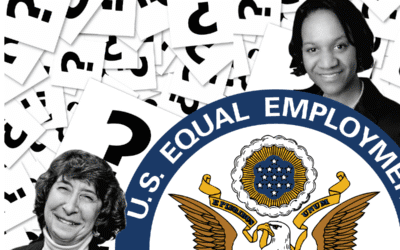Ever been around the table during a job interview and you think this is the perfect candidate. And just then, a colleague on the interview team leans in and asks, “So… what do you currently make?” You freeze and the candidate freezes. Then she answers, “That’s a bit personal, don’t you think?”
Well, guess what? In some states, it’s not only personal, it’s also illegal. As a reminder to employers in D.C., Virginia and Maryland, here’s what you need to know about the current status of salary history bans — those laws that say “nope” to asking job candidates how much they make (or made) at their current (or former) job.
What’s the Big Deal With Salary History?
Salary history bans are part of a broader effort to close gender and racial pay gaps. The idea is simple: if someone was underpaid in the past, and new employers base their offers on that past salary, the underpayment follows them forever. These laws aim to make compensation about the role and the market — not the candidate’s last paycheck.
Washington, D.C.: Strictest of the Bunch
D.C. does not mess around. Under the D.C. Pay Equity Act, which went into effect on January 1, 2024, employers are banned from:
- Asking about an applicant’s salary history;
- Relying on salary history to determine a salary offer; and
- Retaliating against applicants who refuse to provide salary history.
This act applies equally to recruiters and third-party hiring agents, who also cannot inquire. In addition, D.C. employers must also disclose a wage range and available benefit information in all of their job advertisements.
Maryland: No More Fishing for Figures
In Maryland, it’s been illegal for employers to ask about a job applicant’s salary history since 2020. The key points to that law state:
- Employers cannot ask about salary history (past wages, benefits, or compensation).
- Employers must post minimum and maximum wage ranges and a general description of benefits in all ads.
- Employers must provide a wage range for the position upon request.
- After an offer is made, employers can discuss and verify salary history — but only if the applicant voluntarily provides it.
Virginia: The Outlier
As of now, Virginia does not have a salary history ban. In fact, in March 2024, Governor Youngkin vetoed bills passed by the VA legislature barring employers from asking about an applicant’s salary history and requiring pay information to be included in job postings. He claimed that the legislation represented government overreach and disregarded business needs, potentially exposing small businesses to lawsuits. So, employers can ask about and rely on a candidate’s past salary when making hiring decisions.
Bottom Line
If you’re hiring in Maryland or D.C., keep salary history questions off the table, or risk fines and lawsuits. If you’re hiring across state lines, the safest approach is to avoid asking about past compensation altogether and focus on the value of the role and candidate qualifications. One good alternative is, “How much are you looking to make if you came to work for us?” That gives the candidate an opportunity to self-correct any prior wage suppression issues and participate meaningfully in wage negotiations.
For guidance on best practices when it comes to hiring new employees, reach out to any RKW employment lawyer.










